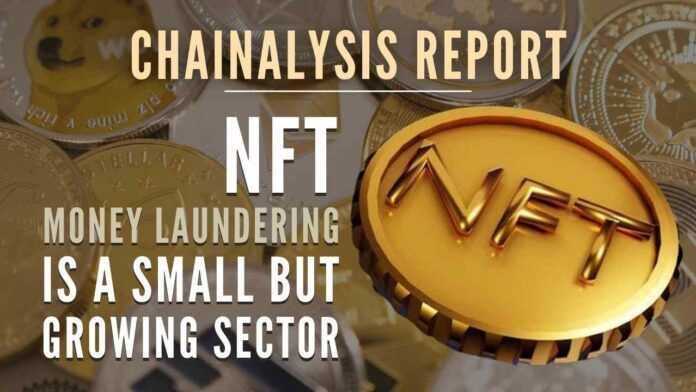
Chainalysis detects significant money laundering in emerging NFT sector
According to the Chainalysis report released on Wednesday, money laundering through the buying and selling of Non-Fungible Tokens (NFTs) is a small but growing sector of criminal activity.
NFTs are blockchain-based digital items whose units are designed to be unique, unlike traditional crypto currencies whose units are meant to be interchangeable.
“While money laundering in physical art is difficult to quantify, we can make more reliable estimates of NFT-based money laundering thanks to the inherent transparency of the blockchain,” the report said
Chainalysis tracked a minimum $44.2 billion worth of crypto currency sent to ERC-721 and ERC-1155 contracts — the two types of Ethereum smart contracts associated with NFT marketplaces and collections — up from just $106 million in 2020.
The report says, “All of these activities represent a drop in the bucket compared to the $8.6 billion in crypto currency-based money laundering we tracked throughout 2021,” “Nevertheless, money laundering, and in particular transfers from sanctioned crypto currency companies, poses a major risk to building trust in NFTs, and should be monitored more closely by marketplaces, regulators and law enforcement.”
The same Chainalysis report also points to a growth in wash trading, the practice of NFT owners “selling” an NFT by sending money to themselves from a crypto currency wallet that they control, and creating a false impression of value. Wash trading has long been a problem for crypto currency exchanges — where it gives a misleading sense of trade volume — but it is now increasingly a problem for NFT marketplaces too.
Chainalysis identified thousands of cases of NFTs bought from self-financed addresses, meaning instances where either the wallet address that purchased the NFT had first been sent money by the selling address of the NFT, or a common address had sent funds to both buyer and seller addresses.
[With Inputs from IANS]
PGurus is now on Telegram. Click here to join our channel and stay updated with all the latest news and views
For all the latest updates, download PGurus App.
- ECI issues show cause notice over alleged MCC violations by PM Modi, Rahul Gandhi; seeks response from BJP, Congress chief - April 25, 2024
- Will make India our global export hub: Hyundai Motor Group chief - April 25, 2024
- Maharashtra Police summon actress Tamannaah Bhatia in Mahadev betting scam - April 25, 2024










